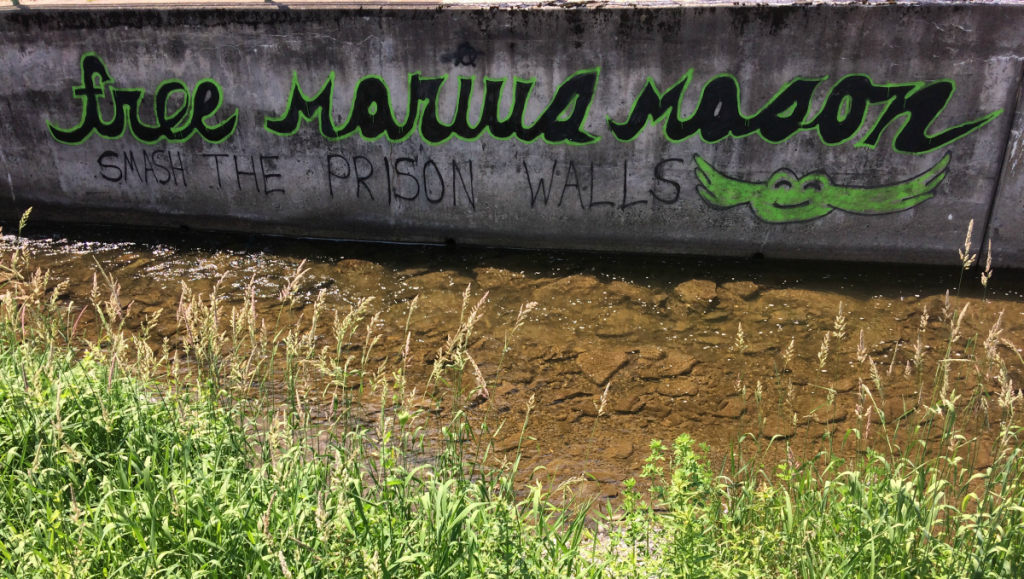June 11 has been observed as a day of solidarity with long-term prisoners since
2004, when 27 cities hosted events to support Jeff “Free” Luers, an eco-anarchist in his fourth year of imprisonment for the burning of three SUVs in Eugene, Oregon. While a rich history of solidarity practices already existed in North America, those were focused on the Black Liberation and anti-imperialist movements
and the
hundreds of prisoners still held captive for decades. The capture of Luers and his co-defendant Craig “Critter” Marshall forced the radical environmental and anarchist movements to confront the question of repression in new ways after Luers was sentenced to 22 years and 8 months for an action that didn’t hurt anyone. Despite FBI harassment of public educational events, the
Break the Chains collective and Luers’s support crew organized the solidarity day to mark the third anniversary of his arrest, inviting Ramona Africa to speak in Eugene as a step toward bridging the gap between different generations fighting repression. Ramona is a member of the
MOVE family, a group of predominantly Black revolutionaries. Since the first arrest in 1978, Ramona supported, and as of 2020 helped free, her imprisoned comrades through over 40 years in prison for a diabolical, racist frame-up.
Luers’s dignified position throughout his imprisonment and the ongoing fight to release him were vital reference points over the following years as repression intensified into what became known as the
Green Scare. The Green Scare extended far beyond the series of cases directed against Earth Liberation Front groups. When Operation Backfire struck in December 2005, leading to the capture of many of the participants in a prolific ELF cell in the Pacific Northwest, it was also intended to sever the connections between eco-saboteurs and mainstream environmental groups, with the FBI aiming to punish many of the latter for their tacit support of radical action. The Green Scare also included many of the classic petty gestures of repression: police harassment and surveillance, blacklists preventing employment, frivolous lawsuits and interventions in civil cases. For example, the harassment directed over many years against
Marius Mason and his then-husband Frank Ambrose left the two of them nearly unemployable and surrounded by a trench of fear. Years later, some of Frank’s former friends suggested that this was the aspect of the Green Scare that wore him down—particularly as others in the Midwest chose to distance themselves from those under the most intense pressure rather than take a stand against it. Ambrose ultimately chose to cooperate with the authorities, informing against Marius and many others.
The other day when I spoke to Marius on the phone he was dealing with worries ranging from uncertainty about whether or not he might be immune to COVID-19, to the national BOP lockdown. And still! He was so focused on the well-being of everyone out here. He was very worried about me — whether I was getting enough rest, whether he was bothering me at a time that I needed to be talking to other clients. He was worried for the protesters suffering at the hands of law enforcement and the black and brown people trying to live their lives under a regime of daily violence and indignity. He expressed so much love for the people agitating for an end to white supremacy. “Racism is the poison at the heart of America,” he said. “Everybody knows it, and this is the conversation we need to have.”Marius is an example of someone suffering unduly at the hands of a government that was more interested in punishing him under the rubric of “terrorism” than in ending the atrocities against the environment that he has spent his life trying to correct. And now once again he is watching the state manufacture an imaginary threat: Antifa. No matter that Trump lacks any authority to designate “antifa” a terrorist threat in any legally meaningful way. His announcement will function to broadcast to law enforcement, prosecutors, judges, and juries that they may severely punish people not only for their conduct, but for their political beliefs.
Just as Marius must endure an unconscionably long sentence for actions that would otherwise have been less severely punished, we can anticipate similar state repression of many others painted with the intentionally broad brush of “Antifa.” The protections of the first and fourth amendments will lose force in the face of law enforcement and prosecutors invoking the specter of the terrorist at the gate. The deeply racist and anti-semitic discourse of the white outside agitator will authorize the same kinds of outrageous prosecutions and draconian sentences that Marius was and is now subject to. We must gather together in solidarity and make clear: our speech will not be chilled, our actions will not be quelled, our righteous anger and commitments to justice will not be diminished by these bullies and these laughable claims about our beliefs. Our communities are strong. We fight for and stand with each other in a genuinely anti-racist, gender inclusive, class- and ability-conscious coalition.
This is the conversation we need to have. Marius stands with all oppressed people, and the political uprisings that represent them, from Stonewall, to Black Lives Matter, to concerted antifascist action, Marius sends deep revolutionary love and solidarity.
Moira Meltzer-Cohen, Attorney at Law


Hang in there all of you. I did my 3 years in Minnesota 17 months in shu for trees